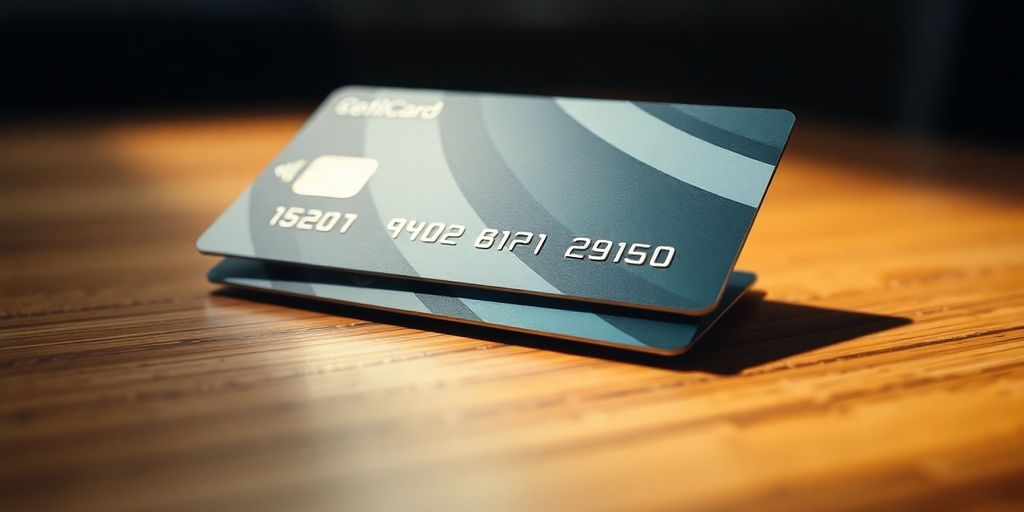Credit Card Alternatives: Building Credit Without Debt

Credit cards are a common way to build credit, but they’re not the only option. In fact, many people either can’t get a credit card or choose not to use one. The good news is there are plenty of ways to establish and improve your credit score without falling into debt. This article will explore various alternatives to credit cards for building credit responsibly.
Key Takeaways
- You can build credit without a credit card by using alternatives like secured cards and credit builder loans.
- Payment history is key to your credit score, so make sure to pay bills on time.
- Consider becoming an authorized user on someone else’s credit card to benefit from their good credit habits.
- Monthly payments like rent and utilities can be reported to credit bureaus to help improve your score.
- Using financial apps can assist in tracking your spending and managing your credit-building efforts.
Understanding Credit Scores

Components of a Credit Score
Okay, so you want to understand credit scores? It’s not rocket science, but it’s good to know the basics. Your credit score is basically a number that tells lenders how likely you are to pay back money you borrow. It’s based on a bunch of different things in your credit history. Think of it like a financial report card.
Here’s a quick rundown of what goes into calculating your score:
- Payment history: Do you pay your bills on time?
- Amounts owed: How much debt do you have?
- Length of credit history: How long have you been using credit?
- Credit mix: What kinds of credit accounts do you have (credit cards, loans, etc.)?
- New credit: Have you recently applied for a lot of new credit?
It’s important to remember that different credit scoring models (like FICO and VantageScore) might weigh these factors a little differently. So, your score might vary slightly depending on where you check it. You can sign up for your free credit score to get started.
Importance of Payment History
If there’s one thing you should focus on, it’s paying your bills on time. Seriously. Payment history is a HUGE deal when it comes to your credit score. It shows lenders that you’re responsible and reliable. Late payments, missed payments, or even worse, defaults, can really drag your score down.
Think of it this way:
| Payment Status | Impact on Credit Score |
|---|---|
| On-time | Positive |
| 30 Days Late | Negative |
| 90+ Days Late | Very Negative |
| Default | Severely Negative |
Impact of Credit Utilization
Credit utilization is another biggie. It’s basically how much of your available credit you’re using. So, if you have a credit card with a $1,000 limit and you’ve charged $500, your credit utilization is 50%. Experts usually recommend keeping your utilization below 30%. High credit utilization can signal to lenders that you’re overextended and might have trouble repaying your debts. It’s a good idea to monitor your credit card defaults to avoid this.
Here’s why it matters:
- Shows responsible credit management.
- Indicates you’re not overly reliant on credit.
- Helps maintain a healthy credit score.
Exploring Alternative Credit Options
Building credit can feel like a catch-22: you need credit to get credit. But what if you don’t want to rack up debt with a traditional credit card? Luckily, there are alternative options available that can help you establish or improve your credit profile without necessarily relying on traditional credit cards. These methods often involve different approaches to assessing creditworthiness and reporting payment behavior.
Secured Credit Cards
Secured credit cards are a great starting point for many. These cards require a cash deposit that acts as your credit line. The deposit minimizes the risk for the issuer, making it easier to get approved even with limited or no credit history. It’s like showing the bank you’re serious and have some skin in the game. Make sure the card reports to the major credit bureaus. After a period of responsible use, some secured cards may even graduate to unsecured cards, returning your deposit. Secured cards are sometimes an option, but they require an upfront deposit and might not work for everyone. Consider these alternative credit cards.
Credit Builder Loans
Credit builder loans are designed specifically to help people build credit. Here’s how they typically work: you apply for a small loan, but instead of receiving the money upfront, the lender holds it in a secured account. You then make monthly payments over a set period. Once you’ve repaid the loan, you receive the funds. The lender reports your payments to the credit bureaus, helping you establish a positive payment history. It’s a bit like forced savings that also builds your credit.
Peer-to-Peer Lending
Peer-to-peer (P2P) lending platforms connect borrowers with individual investors. While P2P loans are often used for debt consolidation or other purposes, some platforms may offer loans that can help build credit, especially if they report your payment activity to the credit bureaus. The interest rates and terms can vary widely depending on your creditworthiness, so it’s important to shop around and compare offers. Startup issuers are exploring new ways of evaluating creditworthiness beyond FICO scores and credit history.
It’s important to remember that while these alternative options can help build credit, they also come with responsibilities. Make sure you understand the terms and conditions, including interest rates, fees, and reporting practices. Always prioritize making timely payments to avoid negative impacts on your credit score.
Utilizing Non-Traditional Payment Methods

It’s easy to think credit cards and loans are the only way to build credit, but that’s not true! There are some other ways to show you’re responsible with money, and these methods are becoming more popular.
Rent Reporting Services
Did you know your rent payments could help your credit score? Rent reporting services work by reporting your on-time rent payments to credit bureaus. This can be a great option if you don’t have a lot of credit history. Consistency is key here; you need to make sure you’re paying rent on time every month for it to have a positive impact.
- Choose a reputable service.
- Ensure they report to major credit bureaus.
- Be aware of any fees involved.
Utility Bill Reporting
Similar to rent, some services allow you to report your utility bill payments. This includes things like electricity, water, and gas. Not all credit scoring models consider this data, but it’s another way to show responsible payment behavior. It’s worth checking if this is an option in your area.
Subscription Services
This is a newer concept, but some companies are starting to factor in subscription payments like Netflix or Spotify into your creditworthiness. The idea is that consistently paying these bills shows you’re reliable. It’s not as widespread as rent or utility reporting, but it’s something to keep an eye on.
Using non-traditional payment methods can be a good way to build credit, especially if you’re just starting out or have limited credit history. It’s not a quick fix, but it can be a helpful addition to your overall credit-building strategy. Just remember to do your research and choose reputable services.
Becoming an Authorized User
Benefits of Being an Authorized User
Becoming an authorized user on someone else’s credit card can be a surprisingly effective way to build your own credit. Basically, you get added to an existing credit card account, and the account’s history starts reflecting on your credit report. This can be especially helpful if you’re just starting out and have little to no credit history.
Here’s a breakdown of the advantages:
- Instant credit history: You inherit the primary cardholder’s payment history and credit utilization.
- Faster credit score generation: It can help you get a credit score faster than if you started from scratch.
- Improved credit utilization: If the cardholder keeps a low balance, it can positively impact your credit utilization ratio.
It’s like borrowing someone else’s good credit habits. However, remember that you’re relying on the primary cardholder’s responsible behavior. If they mess up, it can negatively affect your credit too.
Choosing the Right Cardholder
Not all cardholders are created equal. You want to be an authorized user on an account held by someone responsible. Look for these qualities:
- Long credit history: The longer the account has been open, the better.
- Excellent payment history: Consistent on-time payments are crucial.
- Low credit utilization: A cardholder who keeps their balance low demonstrates responsible credit management. Aim for someone with good credit or excellent credit.
It’s a good idea to have an open conversation with the cardholder about their spending habits and payment practices before becoming an authorized user. Transparency is key.
Potential Risks Involved
While being an authorized user is generally low-risk, there are still potential downsides to consider:
- Negative impact from missed payments: If the primary cardholder misses payments, it will hurt your credit score.
- Increased credit utilization: If the cardholder runs up a high balance, it can negatively affect your credit utilization ratio.
- Account closure: If the cardholder closes the account, it will remove the credit history from your report.
It’s important to monitor your credit report regularly to ensure that the account is being managed responsibly. If you notice any red flags, consider removing yourself as an authorized user. Also, make sure you and the cardholder have an agreement on how the authorized user can use the card.
Building Credit Through Installment Loans
Installment loans can be a solid way to build credit, but it’s important to understand how they work and how they impact your credit score. Unlike revolving credit (like credit cards), installment loans have a fixed payment schedule and a set payoff date. This predictability can be beneficial for both budgeting and credit building.
Types of Installment Loans
There are several types of installment loans, each serving different purposes:
- Auto loans: Used to finance a vehicle, with the vehicle itself often serving as collateral.
- Mortgages: Loans for purchasing a home, typically with long repayment terms (15-30 years).
- Personal loans: Can be used for various purposes, such as debt consolidation, home improvements, or unexpected expenses. These can be secured or unsecured.
- Student loans: Used to finance education, often with deferred payment options.
- Credit-builder loans: Designed specifically to help people with limited or no credit history establish a positive payment record. These are often smaller loans where the funds are held by the lender until the loan is repaid.
How They Affect Your Credit
Installment loans affect your credit score in several ways:
- Payment history: Making on-time payments is the most important factor in your credit score. Consistent, timely payments on your installment loans will significantly boost your creditworthiness.
- Credit mix: Having a variety of credit accounts (credit cards, installment loans, etc.) can positively impact your credit score. It shows lenders that you can manage different types of credit responsibly.
- Credit utilization: While not as directly impactful as with credit cards, the amount you owe on your installment loans compared to the original loan amount can still play a role. Keeping your balances reasonable is a good idea.
It’s important to note that taking out too many installment loans at once can negatively affect your credit. Lenders may see this as a sign of financial instability. Choose loans wisely and only borrow what you need.
Managing Loan Payments Effectively
Effective management of installment loan payments is key to building good credit:
- Set up automatic payments: This ensures you never miss a payment and helps avoid late fees.
- Budget carefully: Make sure you can comfortably afford the monthly payments before taking out a loan.
- Avoid overborrowing: Only borrow what you need and can realistically repay.
- Monitor your credit report: Regularly check your credit report to ensure your loan payments are being reported correctly and to identify any potential errors.
Leveraging Financial Technology
Financial technology, or fintech, has changed how we manage our money. It provides new ways to build credit, often without needing traditional credit cards. It’s worth checking out if you’re trying to improve your credit score.
Apps for Credit Building
There are a bunch of apps designed to help you build credit. These apps often work by reporting your regular payments, like rent or utilities, to credit bureaus. Some apps even offer small credit lines specifically for building credit. It’s a good idea to research different apps and see which one fits your needs. Here are a few things these apps might do:
- Report rent payments to credit bureaus.
- Offer secured credit lines.
- Provide credit monitoring and alerts.
Alternative Credit Scoring Models
Traditional credit scores aren’t the only game in town anymore. Alternative credit scoring models are popping up, and they look at different types of data to assess your creditworthiness. This can include your banking history, bill payments, and even your employment history. These models can be helpful if you have a limited credit history or are trying to rebuild your credit.
These alternative scoring models can be a great way for people with thin credit files to get approved for loans or credit cards. They offer a more complete picture of your financial behavior.
Using Fintech for Budgeting
Fintech isn’t just about credit building; it can also help you manage your money better. Budgeting apps can help you track your spending, set financial goals, and identify areas where you can save money. Good budgeting habits can lead to better financial health, which can indirectly improve your credit score. Here’s a simple example of how a budgeting app might categorize your spending:
| Category | Amount Spent |
|---|---|
| Rent | $1,200 |
| Groceries | $300 |
| Entertainment | $150 |
| Transportation | $100 |
Maintaining Good Financial Habits
It’s not enough to just start building credit; you’ve got to keep at it. Think of it like going to the gym – you can’t just go once and expect to be in shape forever. You need to build good financial habits and stick with them. It’s about creating a lifestyle that supports your credit goals.
Timely Payments
This is the big one. Payment history is a huge factor in your credit score. Set up automatic payments if you have to. I know, it feels a little scary to just let the bank take money out of your account, but it’s way better than missing a payment. Even one late payment can ding your score. If you can’t do automatic payments, set reminders on your phone, put it on your calendar, whatever it takes. Just pay on time. Consistent on-time payments on credit cards are essential.
Monitoring Your Credit Report
Check your credit report regularly. You can get a free one from each of the major credit bureaus once a year. Look for errors, like accounts you don’t recognize or incorrect payment information. If you find something, dispute it. It’s your right to have accurate information on your report. Plus, monitoring your report can help you catch identity theft early.
Avoiding Unnecessary Debt
This one seems obvious, but it’s easy to fall into the trap of taking on more debt than you can handle. Just because you can get approved for a credit card or a loan doesn’t mean you should. Think carefully about whether you really need something before you put it on credit. And if you do, make a plan to pay it off as quickly as possible. Try to avoid accumulating high balances, as this can negatively impact your credit utilization ratio, which is another important factor in your credit score.
Living below your means is a great way to avoid unnecessary debt. It’s not always easy, but it’s worth it in the long run. It gives you more financial freedom and reduces stress. Plus, it helps you build good financial habits that will benefit you for years to come.
Wrapping It Up
So, there you have it. Building credit without a credit card is totally doable. You’ve got options like becoming an authorized user, getting a credit-builder loan, or even using services that report your rent payments. It’s all about finding what works for you and sticking with it. Remember, the goal is to show lenders that you can handle credit responsibly. Just keep an eye on your spending and make those payments on time. With a little patience and smart choices, you can build a solid credit history without falling into debt.
Frequently Asked Questions
What is a credit score and why is it important?
A credit score is a number that shows how good you are at paying back money you owe. It helps lenders decide if they can trust you to pay back loans or credit.
Can I build credit without a credit card?
Yes, you can build credit without a credit card by using options like secured credit cards, credit builder loans, or reporting your rent payments.
What is a secured credit card?
A secured credit card is a type of credit card that requires you to put down money as a deposit. This deposit acts as your credit limit.
How do credit builder loans work?
Credit builder loans are small loans that you pay back over time. The money you pay goes into a savings account, and once it’s paid off, you get the money.
What does it mean to be an authorized user?
Being an authorized user means you can use someone else’s credit card without having your own. Their good payment history can help your credit score.
How can I keep my credit score healthy?
To maintain a good credit score, make sure to pay your bills on time, check your credit report regularly, and avoid taking on too much debt.




Responses